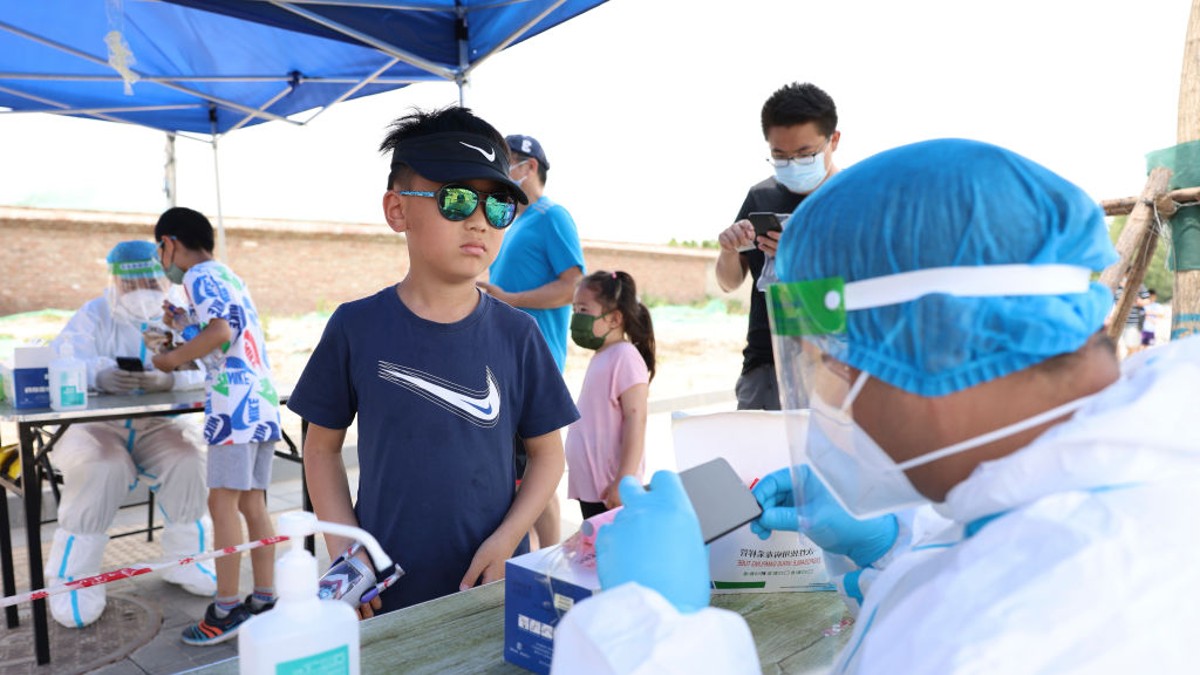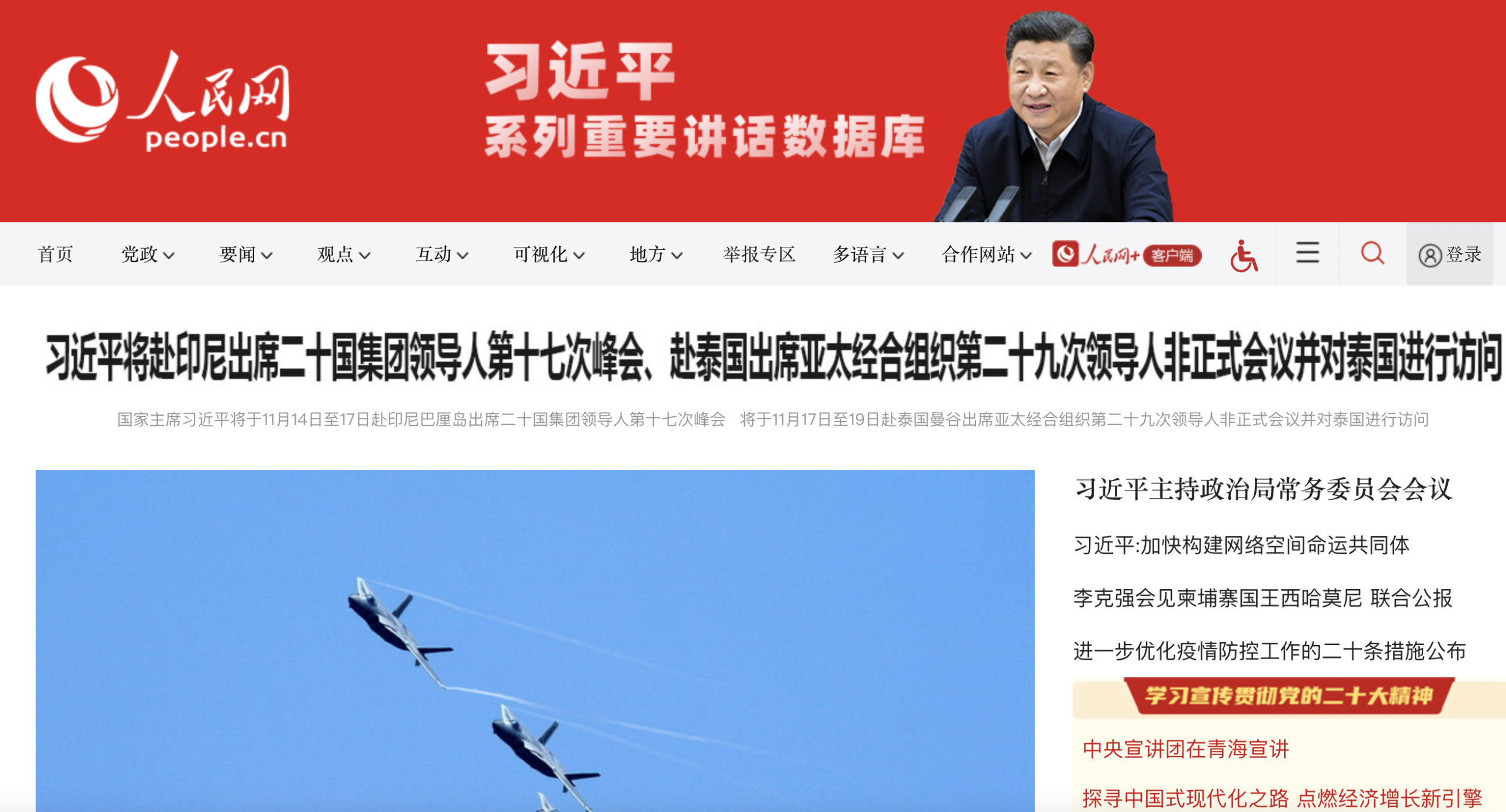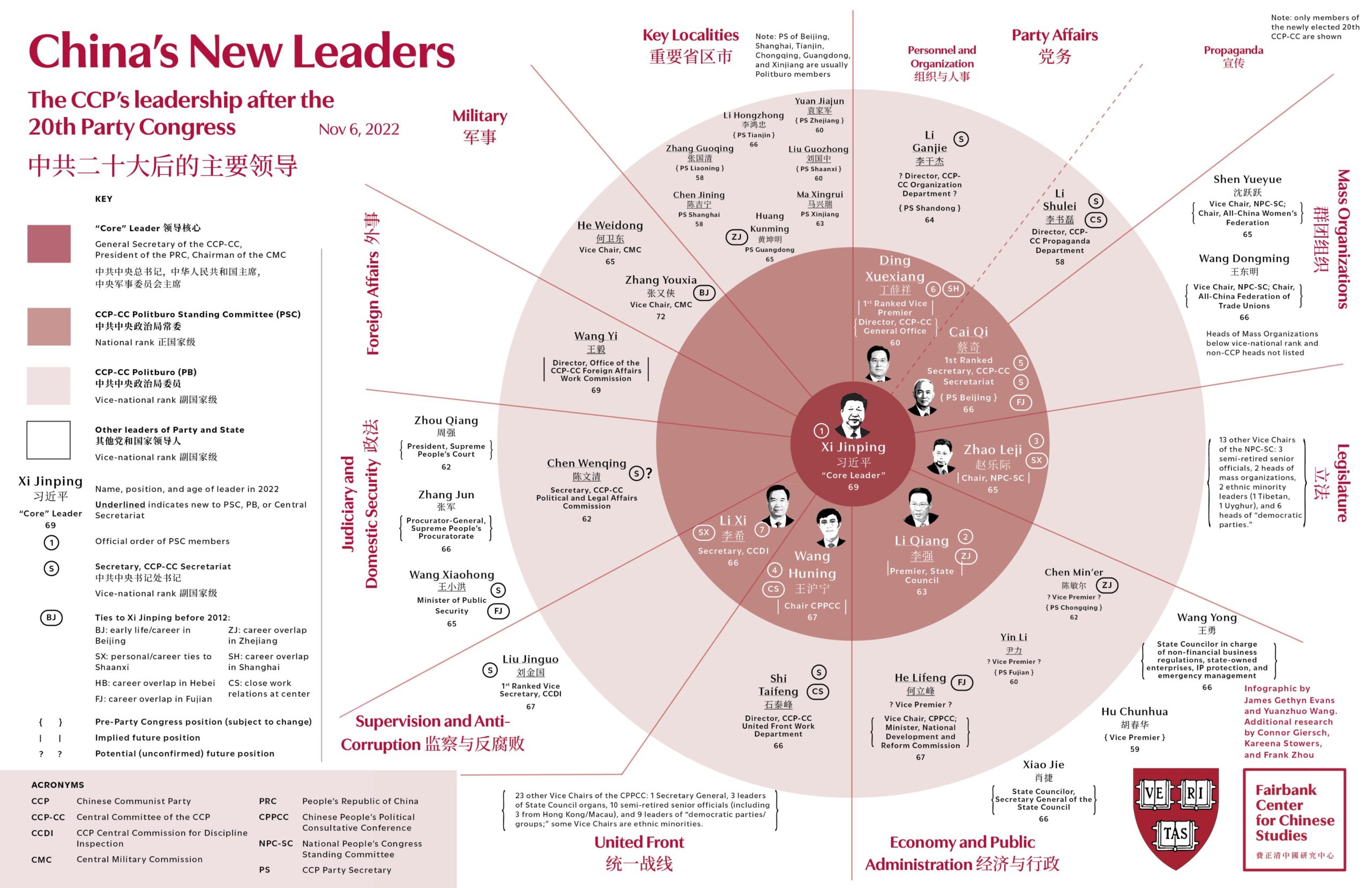China’s not reopening. It’s regressing.

(Photo by Lintao Zhang/Getty Images)
You’ll be reading, watching, feeling and even re-Eloning that China’s cutting (slashing is the preferred word in an exponentially sycophantic state media) quarantine times for inbound travelers and they’ll be scraping flight bans for planes which were just too 6-degrees-of-infection-ish for officials a few hours ago.
You’ll be told it’s ‘a significant calibration’ of Covid Zero.
You’ll also be told the top leadership is making some upbeat tweaks to some of the language around the zero-COVID policy, highlighting the need to minimise the Draconian impact it’s been having on people’s lives.
In fact, with all this talk of China relaxing its paranoid grip on social restrictions inspired by President Xi’s zero-COVID policies, top analysts at Stockhead (me, Bevo, Eddy, Reuben, Pete… pretty much everyone sans Gregor!) decided to look into the likelihood of China reopening its vast markets of opportunity to ordinary punters both on the street in cities like Shanghai and Guangzhou to the exporters who like to open their wallets, like Australia.
So if you’re pressed for time and need something definitive, then…
No, silly.
The answer is no.
China slashes quarantine …etc

Late on Thursday China’s National Health Commission had the Chinese mainland reporting 1,133 locally transmitted COVID-19 cases. That number’s hardly as relevant as Xinhua’s headline reporting this week of Xi’s chairing of a “key meeting” of the Communist Party of China which state media faithfully said reaffirmed “the need for the nation to unswervingly stick to a dynamic zero-COVID policy”, marshalling the party for a doubling down on official efforts to “protect people’s lives and health.” and for a more scientific, targeted and efficient response to the pandemic.
The giveaway here is the use of the tortured Mao-era use of the expression – 坚定不移 (jiān dìng bù yí) – unswervingly.
This means “no f..king wriggle room”.
Sure, on Friday, the State Council’s COVID-19 people did slightly amend the instant quarantine on arrival from seven days to five, but it’s still followed by three days of isolation at home. Just in case you explode.
The other headline measure is simply the cancellation of cancelling international flights if too many passengers from previous flights test positive on arrival – the other mega hassle of visiting China – the State Council’s Covid-19 prevention team said.
Not that it matters to actual people inside China, who’re still only reading whatever Xi’s up to:
The headline says “Xi Jinping will go to Indonesia to attend the 17th G20 Leaders’ Summit, Thailand for the 29th APEC Economic Leaders’ Meeting and to visit Thailand”

Since the 20th Party Congress rubber-stamped Xi Jinping’s ascension to absolute ideological monarch, the signals are of a return to not just zero-COVID, but zero-THE-LAST-THREE-DECADES.
Writing in Foreign Affairs magazine this week, ex-Aussie PM and straight-shooting China infuriator, Kevin Rudd says a few weeks of new policy directions “make it clear that China is now breaking from decades of political, economic, and foreign policy pragmatism and accommodationism.”
Rudd says the assertiveness of Xi’s China is merely the beginning.
“He is less subtle than his predecessors, and his ideological blueprint for the future is now hiding in plain sight.
“The question for all is whether his plans will prevail or generate their own political antibodies, both at home and abroad, that begin to actively resist Xi’s vision for China and the world. But then again, as a practicing Marxist dialectician, Xi Jinping is probably already anticipating that response — and preparing whatever countermeasures may then be warranted.”
Yep. That 20th Party Congress really changed the way the game is played.
It was a whole lot more than just a rubber-stamp for a few personnel changes.
As Rudd puts it: “The party constitutionally entrenched Xi as the core leader of the Central Committee and declared Xi Jinping Thought on Socialism With Chinese Characteristics for a New Era to be the new Marxism of the 21st century.”
That gives a little extra oomph and cache to the consistently furious Radio Free Asia which has taken the worst out of a November 1st State council decree (see below) announcing that the CCP under Xi is accelerating “a return to the state-run economics of the Mao era, with local governments and neighbourhoods ordered to build self-contained community depots to serve residential compounds in time of need, RFA claims to have been told ‘by experts’ in recent interviews.”
A joint communique from both the ministries of housing and civil affairs have ordered residential communities in pilot areas to build “self-contained service depots in residential compounds offering convenience stores, vegetable stalls, state-run canteens, mail and express delivery service facilities, hair salons, laundry shops, pharmacies, maintenance points, and housekeeping services.”
What’s troubling here is not the soup kitchen charity idea of socialist style malls, but the idea that – if rolled out nationwide – the return to Stalin-era style services would entrench the state’s capacity to make it far easier to totally confine people to their homes.
Now that’s whether due to zero-COVID or – critically – any other national contingencies which Xi Jinping finds appropriate for emergency measures be it war, natural disaster, civil unrest or sheer convenience.
According to the orders any grouping of 100 households must have a comprehensive service hub of at least 30 square metres under the pilot plan, which will be implemented by local governments and district and neighborhood committees.
These canteens are pretty chilling because they’re about controlling people through food and necessities. Tying the population further to the CCP, the state as parent and provider.
And most importantly allowing the state to impose emergency measures anywhere and at any time.
Xi Jinping is flexing his new powers by politicising food, and who gets to eat it.
The headline says: “The two departments have issued a notice to carry out the pilot work of constructing a complete community”

All this has come quickly in a week of premature investor celebration and depression: first rumours of an easing of zero-COVID policies, quickly followed by the rolling out of the usual suspects with officials discounting the same rumours a day later.
It’s all quite simple: China’s COVID situation and its Xi Jinping situation are indelibly linked and they are only going to get worse.
The daily case count surged to six-month highs over the weekend. Guangzhou indefinitely delayed its auto show that was supposed to kick off next week. And schools in Beijing are waffling over whether to shift classes online, according to social media.
As of Monday, China’s Covid controls negatively affected 12.2% of national GDP — up from 9.5% a week ago, according to Nomura’s model.
The Japanese bank said more than one-fifth of China’s population was subject to some kind of control measures.
The southern province of Guangdong where companies like Apple depend on local production has been the hardest hit.
China’s factory gate prices for October dropped for the first time since December 2020 and consumer inflation moderated, in part due to strict COVID curbs.
Apple’s critical and endlessly troubled supplier Foxconn told local media it would persist with the staff live-at-work deal at its Shenzhen iPhone factory, although its exposure to infection remains a secret, that of itself left Apple stock reeling on Monday, prompting the iPhone maker to flag a production warning.
“We continue to believe that, while Beijing may fine-tune some of its Covid measures in coming weeks, those fine-tuning measures could be more than offset by local officials’ tightening of the [zero-Covid strategy],” Nomura’s China chief economist Ting Lu said in an interview earlier this week with CNBC.
The 20th Party Congress rubber-stamped a number of significant political and personnel changes.
Although, this from the Fairbank Centre should clarify it all:

Old/New Marxism
Just repeating K. Rudd here because it’s a lot to remember – the party constitutionally entrenched Xi as “the core leader of the Central Committee” and declared “Xi Jinping Thought on Socialism With Chinese Characteristics for a New Era” to be “the new Marxism of the 21st century.”
“Given the precise dynamics of that day, the act of Hu being marched off the stage was rich with symbolism. China under Xi is now very much a one-man show,” Rudd says.
Meanwhile, Xi Jinping is indeed headed across Southeast Asia, just like Albo. China wants to get busy on some kind of an upgrade to its giant free-trade zone in the hopes of shoring up the stability of Beijing’s long and intertwined manufacturing supply chains as nations are being pushed to choose sides in China’s accelerating rivalry with the US.
Officials in Beijing have told state-run media they will approach leaders in the Association of Southeast Asian Nations (ASEAN) bloc this week about accelerating negotiations for what they call the ASEAN-China Free Trade Area “Version 3.0”.
The outgoing (politically, not personally) and largely defrocked Chinese Premier Li Keqiang is in Phnom Penh this week to meet with the bloc’s 10 members.
As Rudd says in Foreign Policy: In China, words matter, never more so than when a premier uses them during his ascension.
Here’s our man, striding the world like a colossus:
With the 20th Party Congress, China has officially broken from decades of political and foreign policy pragmatism. The Deng era of Chinese politics is over. And the Xi era may have only just begun. An afterword in @ForeignAffairs to my recent cover story. https://t.co/WW7fnMgUYi
— Kevin Rudd (@MrKRudd) November 9, 2022
“Marxism,” Rudd notes, also makes multiple appearances in the 20th NPC speech by Xi.
“And it is surrounded by other language suggesting that Xi is girding for conflict.”
During Xi’s 2022 work report speech at his installation as all powerful leader – an event enough to make reformist ex-president Hu Jintao reel in his seat and get himself dragged out, (symbolically or otherwise) – he mentions the Marxist-Leninist concept of “struggle” ie: striving through violent or nonviolent means to resolve domestic or international societal challenges. Rudd and other scholars say the word is used 22 times.
“By ideological definition, the concept authorises Xi to engage in various forms of confrontation to advance his revolutionary cause. And the leader’s report was followed by an intensive propaganda campaign, for both public and internal party consumption, on the need for China to prepare for the difficult times by toughening its ‘spirit of struggle’.
“This struggle is not limited to the party’s challenges on the home front (including potentially within the party itself). It is also directed to China’s challenges around the world, including with the United States,” Rudd says.
Via France 24
Meanwhile Xi is using language and legislation to stifle market-friendly policies, with China now set to remove calls for economic reform and opening up from upcoming legislation, replacing them with a loyalty clause to none other than Xi himself and his signature ideology.
Under the draft amendment released to the public, the revised “legislation law” would no longer call for legislation to be made “in compliance with the basic principles laid down in the Constitution” or for economic development to be taken as a “central task.”
Language that calls for adhering to reform and opening up is deleted.
The new law rather calls for the creation of something, anything legalise-y sounding which adheres instead to “Xi Jinping Thought on Socialism with Chinese Characteristics for a New Era.”
That’s a law expected to pass as early as this year.
But perhaps the clincher for any holdouts on China returning to its once friendly ‘reform and opening up’ stance on the global stage has been the total suffocation and strangulation of Chinese tech and its formerly dazzling entrepreneurs, like Alibaba’s Jack Ma.
This week is Singles Day. You haven’t heard much about it because the whole idea is on the nose at the moment as it’s entirely in opposition to Xi’s idea of personal control.
Over the weekend, Reuters reports instead that China’s securities watchdog announced it’ll support bond issuance by central state-owned enterprises (SOEs) to fund tech innovation.
The China Securities Regulatory Commission says that banks, social security fund and other long-term investors are encouraged to invest in tech innovation bonds issued by SOEs controlled by the central government.
China’s tech giants are second fiddle to innovative figments of state-owned imagination. And outside of monopolising energy or corruption, the one thing China’s SOEs can’t do well, is anything.
Related Topics
UNLOCK INSIGHTS
Discover the untold stories of emerging ASX stocks.
Daily news and expert analysis, it's free to subscribe.
By proceeding, you confirm you understand that we handle personal information in accordance with our Privacy Policy.








